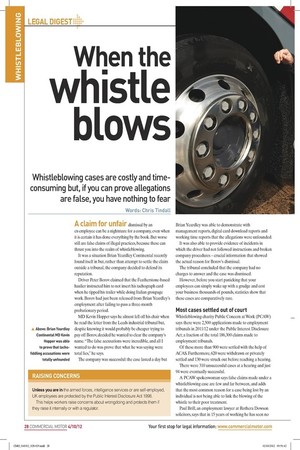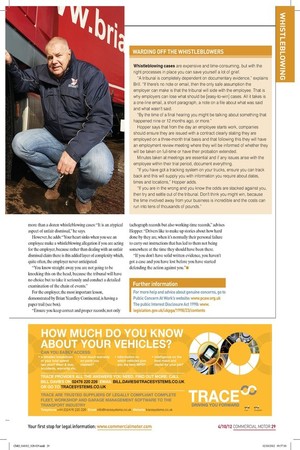When the
Page 20

Page 21

If you've noticed an error in this article please click here to report it so we can fix it.
whistle blows
Whistleblowing cases are costly and timeconsuming but, if you can prove allegations are false, you have nothing to fear
Words: Chris Tindall
A claim for unfair dismissal by an ex-employee can be a nightmare for a company, even when it is certain it has done everything by the book. But worse still are false claims of illegal practices, because these can thrust you into the realm of whistleblowing.
It was a situation Brian Yeardley Continental recently found itself in but, rather than attempt to settle the claim outside a tribunal, the company decided to defend its reputation.
Driver Peter Borov claimed that the Featherstone-based haulier instructed him to not insert his tachograph card when he tipped his trailer while doing Italian groupage work. Borov had just been released from Brian Yeardley’s employment after failing to pass a three-month probationary period.
VID Kevin Hopper says he almost fell off his chair when he read the letter from the Leeds industrial tribunal but, despite knowing it would probably be cheaper trying to pay off Borov, decided he wanted to clear the company’s name. “The false accusations were incredible, and all I wanted to do was prove that what he was saying were total lies,” he says.
The company was successful: the case lasted a day but Brian Yeardley was able to demonstrate with management reports, digital card download reports and working time reports that the allegations were unfounded.
It was also able to provide evidence of incidents in which the driver had not followed instructions and broken company procedures – crucial information that showed the actual reason for Borov’s dismissal.
The tribunal concluded that the company had no charges to answer and the case was dismissed.
However, before you start panicking that your employees can simply wake up with a grudge and cost your business thousands of pounds, statistics show that these cases are comparatively rare.
Most cases settled out of court
Whistleblowing charity Public Concern at Work (PCAW) says there were 2,500 applications made to employment tribunals in 2011/12 under the Public Interest Disclosure Act; a fraction of the total 186,300 claims made to employment tribunals.
Of these more than 900 were settled with the help of ACAS. Furthermore, 620 were withdrawn or privately settled and 130 were struck out before reaching a hearing.
There were 310 unsuccessful cases at a hearing and just 94 were eventually successful.
A PCAW spokeswoman says false claims made under a whistleblowing case are few and far between, and adds that the most common reason for a case being lost by an individual is not being able to link the blowing of the whistle to their poor treatment.
Paul Brill, an employment lawyer at Rothera Dowson solicitors, says that in 15 years of working he has seen no more than a dozen whistleblowing cases: “It is an atypical aspect of unfair dismissal,” he says.
However, he adds: “Your heart sinks when you see an employee make a whistleblowing allegation if you are acting for the employer, because rather than dealing with an unfair dismissal claim there is this added layer of complexity which, quite often, the employer never anticipated.
“You know straight away you are not going to be knocking this on the head, because the tribunal will have no choice but to take it seriously and conduct a detailed examination of the chain of events.” For the employer, the most important lesson, demonstrated by Brian Yeardley Continental, is having a paper trail (see box).
“Ensure you keep correct and proper records; not only tachograph records but also working-time records,” advises Hopper. “Drivers like to make up stories about how hard done by they are, when it’s normally their personal failure to carry out instructions that has led to them not being somewhere at the time they should have been there.
“If you don’t have solid written evidence, you haven’t got a case and you have lost before you have started defending the action against you.” ■
Further information
For more help and advice about genuine concerns, go to Public Concern At Work’s website: www.pcaw.org.uk The public Interest Disclosure Act 1998: www. legislation.gov.uk/ukpga/1998/23/contents










































